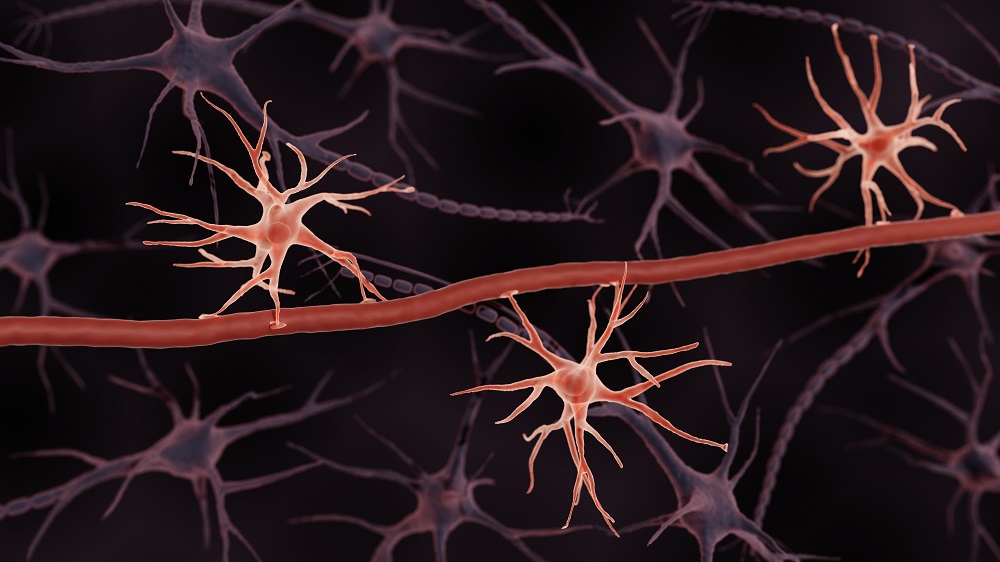Epigenetic Memory Might Underlie Multiple Sclerosis
- Astrocytes sometimes remember more than they should.

In an in-depth paper in Nature, researchers have explained how astrocytes, helper cells that provide crucial brain functions, epigenetically remember things in a way that encourages inflammation.
Traumatized cells
Long-lived immune cells, including T cells and B cells, can remember foreign pathogens [1]. This is why people can become immune to diseases after catching them once, and it is the basis for vaccination. However, previous research has found that, while protective, these learned responses can also be the basis for dangerous inflammation [2].
Little work had been previously done in determining how much this learning process affects astrocytes, which play an immune role in the brain alongside microglia [3]. As these cells play a crucial protective role when healthy and can be significant causes of brain inflammation when diseased [4], increased inflammation in these cells is a cause for concern. For example, inflamed astrocytes play a role in the devlopment of multiple sclerosis [5], an immune disorder that causes a loss of muscle control.
The pathway of memory
To test how much astrocytes remember, the researchers injected the brains of mice with IL-1β and TNF, two inflammatory factors that are known to induce symptoms similar to multiple sclerosis. One group received this treatment a week after the first treatment.
Even though inflammatory factors were decreased back to a basal level after seven days, the group that had been exposed for a second time expressed stronger responses than the group that had only been exposed once. One of these involved more of the inflammatory factor NF-κB. This increase in inflammation was associated with a decrease in neuronal viability.
RNA transcription analysis also found that histone acetylation, a biochemical process that is necessary for gene transcription, was increased after a second exposure. Specifically, the gene Ep300 was found to be responsible for this effect. Further cellular experiments found that this was intrisic to the individual astrocytes and not the result of signals sent by other cells.
Blocking out the memories
Therefore, the researchers hypothesized that Ep300 was responsible for the epigenetic memory of these astrocytes. To test this, they used CRISPR-Cas9 technology to create astrocytes that did not express it. These astrocytes, as expected, didn’t gain any memory of exposure to inflammatory factors, and so their gene expression was not affected in the long term by this exposure.
Further work found that acetylation was indeed the primary driver of this memory function and that Ep300 appears to be astrocyte-specific; other cells, such as CD4+ T cells, appeared unaffected by the inability to express it. Most critically, a sample of astrocytes taken from human multiple sclerosis patients found that the mouse and cellular findings were recapitulated: inflammatory pathways related to Ep300 were upregulated in these cells as well.
While this paper does not offer any treatments or near-term solutions to these cells becoming prone to inflammatory expression, resetting the memory of astrocytes may become a potential treatment for the crippling disease of multiple sclerosis along with other age-related inflammatory brain diseases.
Literature
[1] Zinkernagel, R. M., Bachmann, M. F., Kündig, T. M., Oehen, S., Pirchet, H., & Hengartner, H. (1996). On immunological memory. Annual review of immunology, 14(1), 333-367.
[2] Netea, M. G., Domínguez-Andrés, J., Barreiro, L. B., Chavakis, T., Divangahi, M., Fuchs, E., … & Latz, E. (2020). Defining trained immunity and its role in health and disease. Nature Reviews Immunology, 20(6), 375-388.
[3] Rodgers, K. R., Lin, Y., Langan, T. J., Iwakura, Y., & Chou, R. C. (2020). Innate immune functions of astrocytes are dependent upon tumor necrosis factor-alpha. Scientific reports, 10(1), 7047.
[4[ Liddelow, S. A., Guttenplan, K. A., Clarke, L. E., Bennett, F. C., Bohlen, C. J., Schirmer, L., … & Barres, B. A. (2017). Neurotoxic reactive astrocytes are induced by activated microglia. Nature, 541(7638), 481-487.
[5] Wheeler, M. A., Clark, I. C., Tjon, E. C., Li, Z., Zandee, S. E., Couturier, C. P., … & Quintana, F. J. (2020). MAFG-driven astrocytes promote CNS inflammation. Nature, 578(7796), 593-599.







